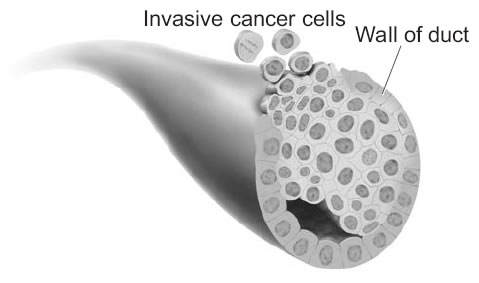Breast cancers can be classified on the basis of four schemes. Each of these schemes classify the cancers based on different criteria and serve a different purpose. Some of these are:
Classification based on pathology
The cancer is classified according to its cellular structure and microanatomy. This is the commonest for of classification or typing the breast cancer
This picture shows ductal carcinoma in situ.

This picture shows cancer cells spreading outside the duct. The cancer cells are invading nearby tissue inside the breast.
Classification according to grade
The pathologist classifies the cancer according to grade. A ''well-differentiated'' tumor for example is low grade and resembles normal tissue. A ''poorly differentiated'' tumor is composed of disorganized cells and, therefore, does not look like normal tissue and is termed high grade. Some are ''moderately differentiated'' or intermediate grade as well.
Classification based on stage of cancer
This is the most commonly used scheme of determining the stage of cancer and the TNM staging that takes into account the Tumor size, lymph Node involvement and Metastasis or spread of the cancer.
Protein & gene status
All breast cancers these days are tested for expression, or detectable effect, of the estrogen receptor (ER), progesterone receptor (PR) and HER2/neu proteins. These tests utilize principles of immunohistochemistry and once the status of these proteins it known, prognosis can be predicted and certain novel therapies may be chosen for treatment.
Histological appearance
Breast cancer is usually, but not always, primarily classified by its histological appearance. Some of the histological types include:
Ductal Carcinoma in situ (DCIS)
This signifies a very early form of cancer that has not spread. DCIS is a type of early breast cancer inside of the ductal system that has not attacked the nearby tissue. It is one of the common types of non-invasive cancer
Infiltrating or invasive ductal carcinoma (IDC)
This is the most common type of breast cancer. It starts in the milk ducts and spreads to surrounding tissues. This can also spread to other parts of the body via lymph channels and blood stream.
Medullary carcinoma
This forms around 15% of all breast cancers. It affects middle aged women more commonly and the cellular histology resembles the medulla (gray matter) of the brain.
Lobular Carcinoma in situ (LCIS)
This is a rarer form of non-invasive tumor. It usually does not develop into invasive cancer. LCIS is more of a “marker” or signal that breast cancer may develop. LCIS has recently been renamed lobular neoplasia.
Infiltrating Lobular Carcinoma (ILC)
This is the second most common type of breast cancer after invasive ductal carcinoma. The cancer begins in the lobules or lobes and spreads to other parts of the body. There is initial appearance of a thickening in the upper-outer section of the breast. These are usually positive for estrogen and progesterone receptors and thus may be treated successfully with hormone therapy.
Tubular carcinoma
The cancer cells appear like tiny tubules. This type of breast cancer is typically found in women aged 50 and above. This tumor responds well to treatment
Mucinous carcinoma or colloid
This is rare type of invasive breast cancer that rarely spreads to the lymph nodes. The cancer cells produce mucus and these cells are distinct from normal cells under a microscope. The mucous and cancer cells combine to form jelly-like tumors.
Paget’s disease
This leads to an eczema-like change in the skin of the nipple. There is itchiness, scaling and oozing discharge from the nipple. 90% of the women who experience these symptoms have an underlying breast cancer. Paget’s Disease can occur at any age but will more likely occur in women who are in their 50s.
Inflammatory breast cancer
This is a rare but aggressive type of breast cancer. The cancer leads to blockage of the lymph vessels in the skin of the breast. The cancer appears to cover the breast over a large area like a sheet rather than a lump. The breast appears swollen, red and inflamed.
Triple negative breast cancer
Breast tumor that is negative for estrogen receptor (ER), progesterone receptor (PR) and HER2/neu proteins.
Metastatic breast cancer
This is a later stage of breast cancer when it has spread to other organs like liver, brain, bones etc.
Sources
- http://www.breastcancer.org/symptoms/types
- http://www.nationalbreastcancer.org/types-of-breast-cancer
- http://cancerhelp.cancerresearchuk.org/type/breast-cancer/about/types/
- www.bcsc.ca/.../Breast-Cancer-Society-of-Canada---Types-of-Breast-Cancer
- http://www.cancer.net/cancer-types/breast-cancer
- http://ww5.komen.org/uploadedFiles/Content_Binaries/806-369.pdf
- www.dhhs.tas.gov.au/.../breastscreen_resource_sect3.pdf
Further Reading
- All Breast Cancer Content
- What is Breast Cancer?
- Breast Cancer Symptoms
- Breast Cancer Causes
- Breast Cancer Pathophysiology
As informações e sugestões contidas neste blog são meramente informativas e não devem substituir consultas com médicos especialistas.
É muito importante (sempre) procurar mais informações sobre os assuntos.
If you are reading this and you are suffering from any kind of human disease, God just heard your prayer,Dr Itua Herbal Center Contact,Email: drituaherbalcenter@gmail.com Or WhatsApp:+2348149277967.
ResponderExcluirI was so very sick when I came across someone telling a story of his life on how Dr Itua gave his dead life back to her, Her Name was Achima Abelard A Germany lady.
Dr Itua helped me to cure my Bladder cancer, I took his treatment for 3 weeks and I was cured completely. He resides in west Africa but I ordered his herbal medicines through Mail which I received within 5 days. I was also instructed on how I will drink it for 3 weeks to cure which I did totally. I'm well now.
I think this Dr Itua is A GOD sent from heaven because i have heard several times that there is no cure but Dr Itua surprises me, put joy on my face.if you are suffering from,Bladder cancer,Throat cancer,Thyroid Cancer,Uterine cancer,Fibroid,Arthritis,Amyotrophic Lateral Sclerosis,Brain Tumor,Fibromyalgia,Multiple myeloma,Leukemia,Liver cancer,Esophageal cancer,Gallbladder cancer,Gestational trophoblastic disease,Head and neck cancer,Hodgkin lymphoma
Intestinal cancer,Kidney cancer,Hpv,Lung cancer,Melanoma,Mesothelioma,Neuroendocrine tumors,Non-Hodgkin lymphoma,Oral cancer,Breast Cancer, Prostate Cancer, Ovarian cancer,Hepatitis,Skin cancer,Soft tissue sarcoma,Spinal cancer,Adrenal cancer.Bile duct cancer,Bone cancer,Stomach cancer
Testicular cancer,Alzheimer's disease,Chronic Diarrhea,Copd,Parkinson,Als,Adrenocortical carcinoma Infectious mononucleosis. Vaginal cancer,Vulvar cancer,Sinus cancer,Brain cancer,Hiv,Herpes,Colon-Rectal Cancer,Chronic Fatigue.